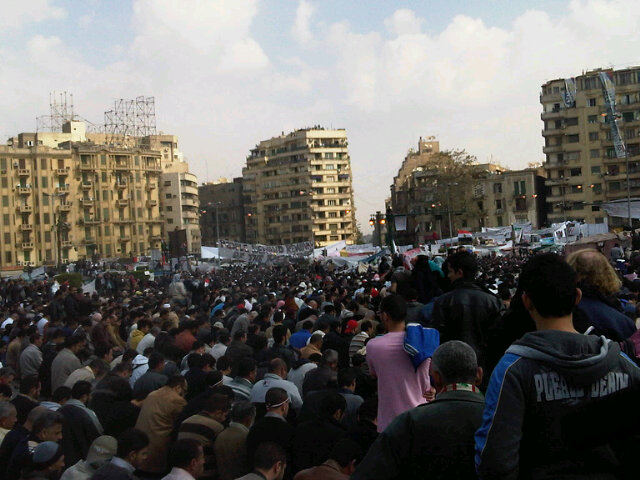 Tahrir Square, Cairo, 11 Feb 2011On this day last year, Egypt's President Hosni Mubarak stepped down, giving way to 18 days of protests.
Tahrir Square, Cairo, 11 Feb 2011On this day last year, Egypt's President Hosni Mubarak stepped down, giving way to 18 days of protests.
To mark the occasion, we post this sharp opinion by Issandr El Amrani on his blog The Arabist:
Fact: The Supreme Council of the Armed Forces, in its stewardship of Egypt's post-Mubarak transition, has not restored security, stability, economic growth.
Fact: The SCAF's transition plan has been so badly thought out that they have made a successful democratic transition extremely difficult, and the timeline for this transition appears still undecided.
Fact: While no political party has particularly shone during this transition, the Muslim Brothers in particular had a decisive influence in backing SCAF's transition plans from an early date.
Fact: The MB's calculations positioned it for a while as the party of stability, to which voters responded well. But now that it is elected, it is as unable to deliver stability as SCAF is.
Fact: The recent events and change in public attitudes towards SCAF — in part due to the patient work of activists – is discrediting the generals and their political allies. This cannot have escaped the MB's attention, or that of their opponents.
Fact: SCAF is on the verge of losing, if it hasn't already, whatever backing it had in the US over the NGOs affair, which is the most serious crisis in bilateral relations since the beginning of the alliance in 1975.
Fact: While the MB and the US are not natural allies, neither are SCAF and the MB. But the MB has an opportunity to be the adult in the room it claims to be here. When a MB leader like Khairat al-Shater says:
“The democratic transition in Egypt is hanging in the balance […] We strongly advise the Americans and the Europeans to support Egypt during this critical period as compensation for the many years they supported a brutal dictatorship.”
surely he can see that the SCAF is hurting Egypt's recovery by antagonizing the very allies that would provide the country with economic relief. Perhaps he should share his views with Brotherhood MPs who applaud the NGO crackdown and Mostafa Bakri's reference to foreign conspiracies.
Fact: The MB needs to strongly consider what Egypt's long-term interests are, as well as its own political interests. It can be a leader in parliament in the call for a civilian-controlled transition process by dropping its attachment to what remains of SCAF's haphazard transition plan and move closer0 to the protest movements' demands for presidential elections and a new constitution produced without SCAF. Or it can continue to defend SCAF's ongoing mistakes and accept the drip-feed of minor concessions, like shuffling former regime prisoners about in jails.
Fact: If it choses the latter, history will not remember the MB kindly.
Fact: A confrontation with SCAF is not without risks. The political unity on a transition plan that should have been there after the overthrow of Mubarak is urgently needed.